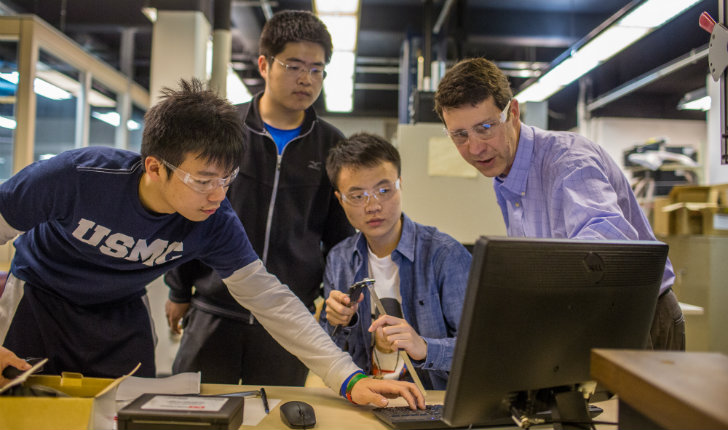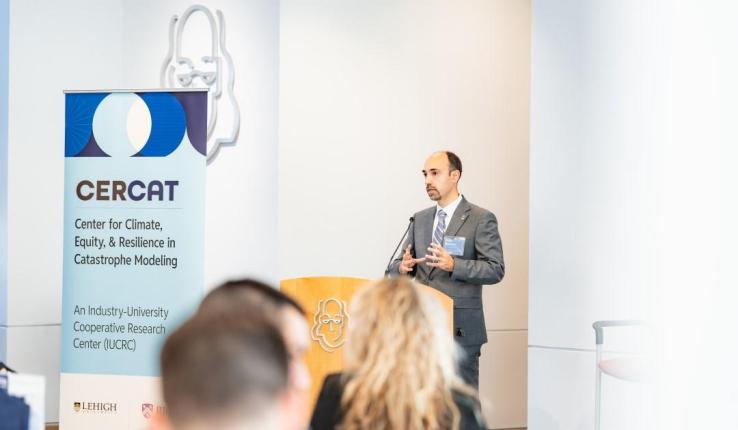Several colleagues shared their impressions of Vinci, who demonstrated a rare gift for relating to people. One of them was New Jersey Zinc Professor Helen Chan, a research partner with Vinci in the department of materials science and engineering, who spoke of him as “a special person who was modest, unassuming but charismatic and likeable, as well as a talented teacher, researcher and administrator.” Chan said she and her colleagues “envied the special relationships that he forged with his students and admired how generous he was with his time.” He was, she said, “academically brilliant, but a real people person who treated everyone around him with warmth and respect.”
She said that generations of students will remember Vinci and his entire class dressing up for Halloween each year, and him picking up the trumpet to play along with the Marching 97 when the band came through the classrooms during Lehigh-Lafayette week. In committees, Chan said he had “a gift for finding consensus, no matter how contentious the issue,” and he had an easy way of developing friendships. “I have not come across a single person who has had a less than positive interaction with him—not anyone. Through his selfless actions and high ideals, he brought out the best in us. We have lost a wonderful human being, far too early.”
Similar sentiments were echoed by Bill Michalerya, former associate vice president for government relations, who worked closely with Vinci in developing external funding for research. “Lehigh lost someone very special in Rick Vinci,” he said. “He was someone who had the respect of students, faculty and staff, and he often took on challenging projects with outside sponsors and government research funding agencies—mostly because he knew that someone needed to do this for the benefit of Lehigh. He always held a much broader view of what was best for the university, and I truly appreciated that.”
Brian Slocum, managing director of Lehigh’s Design Labs and a close friend of Vinci, described him as “quite possibly, the nicest person on the planet,” who always had a smile on his face.
“He was an exceptional colleague, but even more than that, he was a true friend,” Slocum said. “I don't use that term ‘exceptional’ lightly. He was brilliant. But, he carried his brilliance sans ego. I have no doubt he was almost always the smartest person in the room, but he never let you think you were anything but his equal. He listened as much as he spoke. His words were measured and well considered, and everyone's opinion mattered. I felt honored to be one of his friends, to work with him, to laugh with him and to have had the opportunity to share a bit of his life.”
Slocum described him a dedicated partner to his wife and a proud father of his two daughters. “His love for his family – it was clear – was always the driving force in his life.”
His research accomplishments were equally impressive, Slocum said, “but his real loss to Lehigh and beyond was Dr. Vinci, the teacher. He was adored by his students. I remember, even before I actually knew Rick, hearing his students almost speak reverently about him. After I got to know Rick, I immediately knew why! He was one of the few professors that put his duty and responsibility to teaching above all else. He never settled for mediocrity and I don't think had a ‘canned’ lecture. He was constantly updating information and finding new ways to engage his students. He challenged his students, he worked them hard and had high expectations, BUT he was always approachable—he always made time for his students.”
Confirmation of the high esteem in which students held Vinci is found in the nominations for his 2011 Stabler Award for Excellence in Teaching. The students noted his “charisma, enthusiasm and clarity of thought to his art,” along with a style of teaching that lead young minds “on a journey that challenges, enlightens and ultimately shapes (the) thought process.” He was also praised as “a man of great patience and creativity who saw himself as an educator and mentor outside the classroom, sharing his craft and perpetuating the art that is research science.” Another wrote of his astonishing ability to teach complex engineering theories in a way that was both instructional and exciting. “I can honestly say,” wrote one former student, “that he is by far the most influential professor I had while at Lehigh, and he remains so to this day. He is one of the most brilliant intellects I have ever had the honor to know, and he shares a passion for learning that I only wish I could emulate.”
Several students also noted his generosity, sharing his time in and beyond the classroom to help create a cohesive community of learners. Whether in the lecture hall, his office or dinner at his home that joined Vinci’s family with groups of students, “the atmosphere around him is vibrant and open to foster questions, learning and experiencing.” Simply put, said another, “Professor Vinci’s mentorship and teaching have changed my life.”
"Rick was as beloved an educator and colleague as has ever walked Lehigh's campus," said Stephen P. DeWeerth, professor and dean of the P.C. Rossin College of Engineering and Applied Science. "As his peers and students attest, Rick wholly embodied the role of scholar-mentor. He was particularly committed to his students, selflessly giving personal attention to everyone who needed it. His presence, his friendship and his contributions — from research leadership to curricular innovation — will be deeply missed. As a community, our hearts go out to his family at this difficult time.”
DeWeerth also noted that, to honor Vinci’s legacy, the Rossin College has renamed its annual teaching award as the Richard P. Vinci Award for Educational Excellence.
A Prolific Researcher
Vinci came to Lehigh in 1998 from Stanford University, where he led classes in Introductory Science of Materials and Statistical Thermodynamics as acting assistant professor in the department of materials science and engineering. He was promoted to Lehigh associate professor in 2004, after serving as director of the Mechanical Behavior Laboratory. He received his undergraduate degree in materials science and engineering from the Massachusetts Institute of Technology, and his Master of Science and his Ph.D.—both in materials science and engineering—from Stanford.
Throughout his time at Lehigh, Vinci’s research focused on the processing and properties of thin films and other small volumes of material, with an emphasis on characterizing and modifying mechanical behavior. He had published more than 90 technical papers, co-authored an engineering textbook titled, “Deformation and Fracture Mechanics of Engineering Materials, 5e (Wiley, 2012), and was the co-author of two U.S. patents.
His work was funded through competitive research grants from the National Science Foundation, U.S. Army Research Office, Department of Commerce, and Defense Advance Research Projects Agency, as well as equipment grants from the Office of Naval Research and National Science Foundation. He had also obtained numerous non-competitive grants, training grants and contracts from government agencies and industry sponsors.
Vinci served for 18 years as the director of Lehigh's Mechanical Behavior Laboratory, and for four years as director of the Center for Advanced Materials and Nanotechnology (CAMN). He organized numerous professional symposia, including the 2008 Gordon Research Conference on Thin Film and Small-Scale Mechanical Behavior, and served as guest editor for a special issue of the MRS Bulletin on mechanical behavior in small dimensions. He was a member of the Materials Research Society, American Ceramic Society, ASM International, TMS and the American Society for Engineering Education.
Vinci has been a co-advisor for the ASM Summer Materials Camp for high school students at Lehigh, as well as faculty advisor to Lehigh’s student chapter of the national engineering honors society Tau Beta Pi. He's also been featured in several PBS productions, including "NOVA: Secrets of the Samurai Sword," which aired for the first time in 2007, as well as “Treasures of the Earth: Gems” and “Treasures of the Earth: Metals,” both of which first aired in 2016. He served as a consultant for a 2009 NOVA program, “Last Extinction,” and for a 2011 NOVA four-part series, “Making Stuff Stronger, Smaller, Smarter, Cleaner.” Locally, he has served as an organizer of the DaVinci Science Center’s NanoDays student outreach event.
From 2001-2003, Vinci held a P.C. Rossin Assistant Professorship at Lehigh University, and was the Class of 1961 Associate Professor of Materials Science and Engineering from 2004-2006. Among his numerous awards and honors, he received the ASM International Bradley Stoughton Award for Young Teachers, the Outstanding Young Member Award from the Lehigh Valley Chapter of ASM, the ASM Lehigh Valley Chapter Bradley Stoughton Award, the Lehigh University Junior Award for Distinguished Teaching, the P.C. Rossin College of Engineering Teaching Excellence Award, the Lehigh University Donald B. and Dorothy L. Stabler Award for Excellence in Teaching, as well as his department's Gilbert E. Doan Award, which is given by the graduating senior class.






